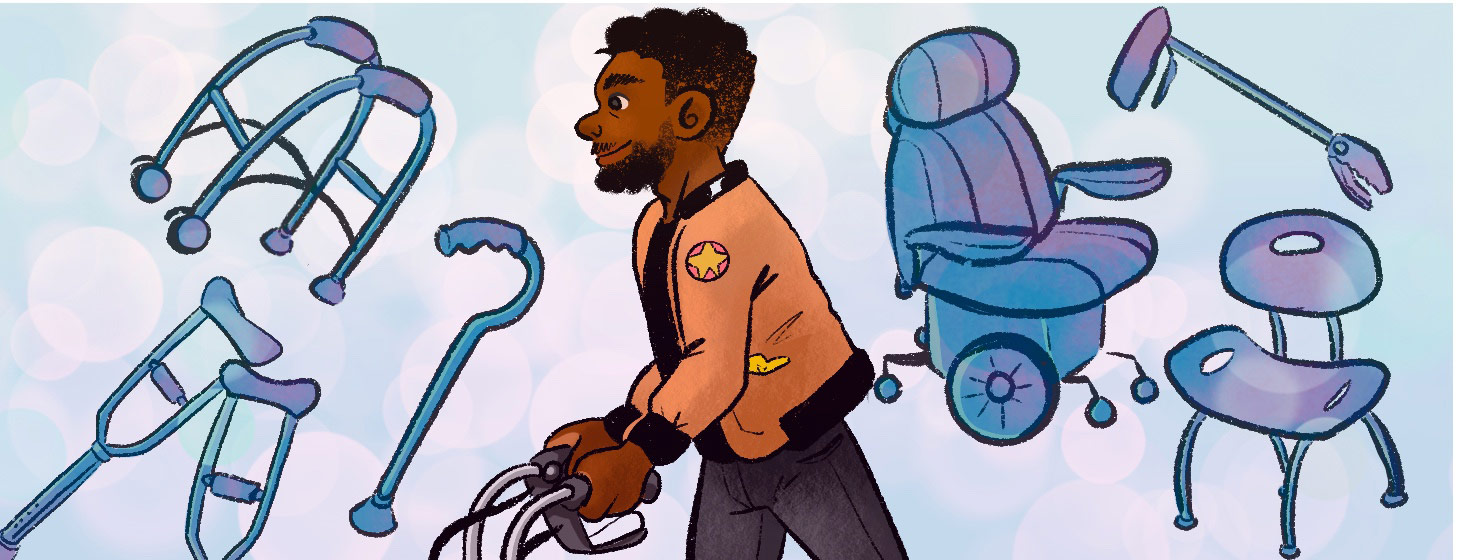Choosing To Use A Mobility Aid For PsA: Why It’s Nobody Else’s Business
When someone suggests you not use a mobility aid because you might "get used to it," my go-to response is: “I hope I do get used to doing something without pain.” That is the dream. But it seems that dream is often misunderstood or scrutinized by those who do not walk – or roll – in my shoes.
Why are mobility aids so controversial?
Let us start with the obvious. Crutches are accepted because it is clear you have an injured leg or foot. However, people may react differently if you lean on a rollator or relax in a wheelchair. The absence of a clear physical injury, like a neon sign, baffles some individuals. This lack of visible proof often invites strangers, coworkers, or even family to comment on your life choices. Whether I use a cane, crutches, rollator, or wheelchair, it does not hurt them. My psoriatic arthritis (PsA) certainly hurts me.
A lesson in insensitivity
In my 30s, my rollator became my best friend. It was not just for balance, but also my portable chair when my lower spine felt like it might snap in half. One day, I was walking to Dunkin’ Donuts with my daughter, who was about 5 years old at the time. We approached the parking lot where a man experiencing homelessness was sitting. I gave him a few dollars for coffee and a donut. After taking the money, he looked me up and down, his eyes landing on my rollator.
“You do not need that,” he said. “You are just lazy.”
Speechless, I shuffled away with my daughter. At that moment, I realized two things. First, society has a long way to go in understanding invisible disabilities. Second, even well-meaning gestures will not protect you from insensitivity. My daughter, now in her 20s, has witnessed many such moments. These experiences shaped her into my fiercest advocate. She is the first to call out anyone questioning accessibility or mobility aids, and I am endlessly grateful for her support.
Mobility aids are lifelines, not limitations
What continues to baffle me is why so many people feel the need to comment on someone else’s use of a mobility aid. These are not fashion accessories or lazy-person props. They are lifelines. A rollator allowed me to walk longer distances with my family. A wheelchair enables me to explore places I would otherwise avoid. These tools give me freedom, not limitations. If anything, my mobility aids are like the superhero gadgets that let me keep up with life – minus the cape. But let us be honest, I would rock one.
Featured Forum
View all responsesWell-meaning comments that miss the mark
Of course, not all remarks come from strangers. Well-meaning friends or relatives might say, “Are you sure you need that?” or “Maybe if you just pushed through the pain?” Listen, Karen, I have tried. Pushing through pain is how I ended up needing these aids in the first place. It is not about giving up. It is about living smarter. Mobility aids do not make me weak. They make me strong enough to keep going.
The emotional toll of insensitivity
Then there is the emotional toll. As someone living with psoriatic arthritis, I thought my skin was thick enough (psoriasis jokes, you have to love them). Yet, insensitive comments still sting. Whether it is a sideways glance, an eye roll, or outright rudeness, it can be hard to brush off. Some days, I laugh it off. Other days, it gets to me. But at the end of the day, I remind myself why I use these aids. I use them to do more, not less, with my life.
Your pain, your choice
The truth is, no one has the right to decide whether you need a mobility aid. Your body, your pain, your choice. If a rollator, cane, or wheelchair helps you live life on your terms, then use it proudly. Forget the naysayers. You do not owe anyone an explanation for prioritizing your well-being.
So the next time someone suggests I ditch the mobility aid, I will just smile and say, “I hope I do get used to it.” Doing life without pain? That is a habit I would love to keep.

Join the conversation